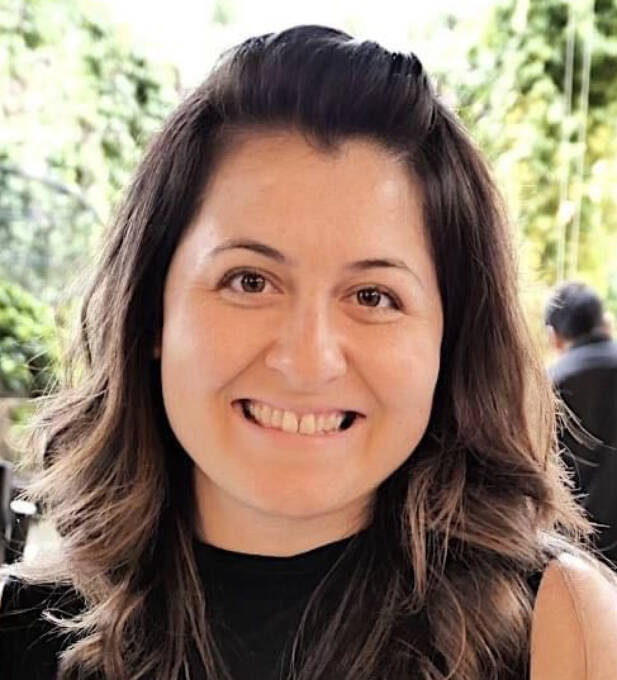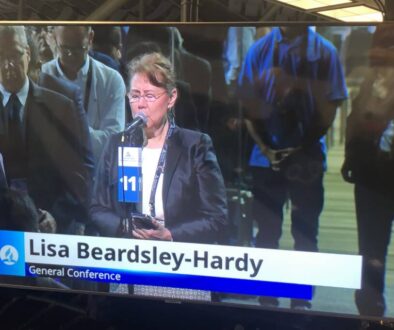JustLove Collective Summit – Day 2
by Rebecca Barceló | 9 May 2024 |
All photos courtesy of Ezekiel Teo, La Sierra University.
 After a late Friday evening catching up with old friends, participants arrived by 9:30am Sabbath morning to attend a spread of activism workshops. From learning how to foster inclusion culture, organize communities, or develop antiracist coalitions, to learning about digital tools for social justice initiatives, for economic empowerment, and advocating for LGBTQ folks, the content was intentional and relevant. There were workshops on environmental care and activism for the earth, and even self-care for the Adventist activist who might be in need of emotional and spiritual renewal from time to time.
After a late Friday evening catching up with old friends, participants arrived by 9:30am Sabbath morning to attend a spread of activism workshops. From learning how to foster inclusion culture, organize communities, or develop antiracist coalitions, to learning about digital tools for social justice initiatives, for economic empowerment, and advocating for LGBTQ folks, the content was intentional and relevant. There were workshops on environmental care and activism for the earth, and even self-care for the Adventist activist who might be in need of emotional and spiritual renewal from time to time.
In the workshop Creating and Fostering Cultures of Inclusion by Michael Nixon, JD, some participants discussed feeling pushed to the edge of their Adventist communities – either due to an adverse life event, a difference in belief, or falling into a minority category of some sort where they don’t fit the mold that is generally accepted in the church community. Nixon shared that often in Jesus’ day, Jesus had to operate among societies that put themselves in the center and pushed Jesus to the edge. In fact, when they were trying to kill him, Jesus left them and they didn’t even notice. “How many churches has Jesus left that are so busy fighting that no one has noticed his departure?” said Nixon. “Jesus knows what it’s like to be on the edge. Please know that when you’re getting pushed to the edge, you’re actually getting pushed to his arms.”
In another workshop, Self-Care for the Social Justice Activist, Sandra Banjoko, Ph.D, led the group through an activity to identify signs of burnout. “Take a few minutes to write on the green, yellow, and red post-its in front of you. On the green, write down things you do when you’re in a good place. A relaxed and happy place.” Participants wrote different scenarios.

I have more patience with others.
I have the desire to be creative.
I feel more open to being in social spaces.
I have time to support others in my life.
“Now write on the yellow post-its some of the warning signs that you’re not doing so well.” Participants continued.
I start procrastinating large projects.
I avoid being in social spaces.
I interrupt other people’s sentences if they take “too long.”
I spend more time binge watching television.
“Finally, on the red post-its, write down some of the signs that you’re not doing so well.” The pens moved a little more reluctantly.
I spend a long time mindlessly scrolling social media to escape.
I make behavioral choices that are damaging to myself or others.
I abruptly cut off friends or family that I can’t deal with.
I find it overwhelming to get out of bed and face my day.
The room was quiet. Banjoko spoke up quietly. “We are God’s instruments for change, but even the strongest tools need tending. Self-care is how we honor God’s work in us.”
For the remainder of the workshop, we discussed rhythms of Jesus that modeled personal, professional, and spiritual boundaries for those who might be experiencing “emotional or physical exhaustion from repeated exposure to pain, trauma, or the suffering of others.”

Banjoko left the group with Mark 12:30, 31: Love the Lord your God with all your heart and with all your soul and with all your mind and with all your strength. And the second commandment is this: Love your neighbor as yourself. There is no commandment greater than these.
“It’s important to be centered in Jesus before serving others. Sometimes we think we have to be ‘broken for the sake of the kingdom,’ said Banjoko. “However there’s no point in producing lots of fruit for the kingdom if the fruit has no taste.”
Between workshops, participants returned to plenary sessions and special features, and at different points throughout the program, excerpts were read from Rev. Dr. Martin Luther King Jr.’s Letter from a Birmingham Jail. One excerpt struck me as especially poignant. Said King,
“Frankly, I have never yet engaged in a direct-action movement that was ‘well timed’ according to the timetable of those who have not suffered unduly from the disease of segregation. For years now I have heard the word ‘wait.’ It rings in the ear of every Negro with a piercing familiarity. This ‘wait’ has almost always meant ‘never.’ It has been a tranquilizing thalidomide, relieving the emotional stress for a moment, only to give birth to an ill-formed infant of frustration. We must come to see with the distinguished jurist of yesterday that ‘justice too long delayed is justice denied.’
It made me reflect on how many black Adventists, female ministers, LGBTQ members, or other minorities in our religious spaces might have also experienced the piercing familiarity of the word “wait.”
 Garrison Hayes led us through the plenary session on the topic of repair once injustice has occurred. He said that repair sometimes requires interruption. “It took courage for the Greeks to speak up in Acts to advocate for their widows among the many miracles, signs, and wonders that were taking place during the early church’s movement (Acts 6). Fortunately, Jesus is not inconvenienced by our interruptions.” He said that repair cannot wait for heart change. “Our obsession with unity and consensus is often damaging to our ability to do what’s right by the least of these in our communities.” And he said that repair is substantive, not symbolic. “For far too long, the aesthetics of justice have been used to pacify and self-soothe, while the materialistic needs are left unhelped.”
Garrison Hayes led us through the plenary session on the topic of repair once injustice has occurred. He said that repair sometimes requires interruption. “It took courage for the Greeks to speak up in Acts to advocate for their widows among the many miracles, signs, and wonders that were taking place during the early church’s movement (Acts 6). Fortunately, Jesus is not inconvenienced by our interruptions.” He said that repair cannot wait for heart change. “Our obsession with unity and consensus is often damaging to our ability to do what’s right by the least of these in our communities.” And he said that repair is substantive, not symbolic. “For far too long, the aesthetics of justice have been used to pacify and self-soothe, while the materialistic needs are left unhelped.”
The afternoon was rich with more community mixers and reflections, but closed with an impassioned appeal to “plug into something already happening in your community.”
Coordinators were thanked, the audiovisual staff was applauded, and presenters were photographed. Finally, organizer Chris Blake thanked the audience and left them with an appeal quite familiar to the La Sierra community. “As Pastor Chris Oberg would often say – ‘Whatever piece of dirt you’re responsible for… whatever dirt you walk on… may it be better because you were there.’”
 Rebecca Barceló is AT’s editor for news and special events.
Rebecca Barceló is AT’s editor for news and special events.




